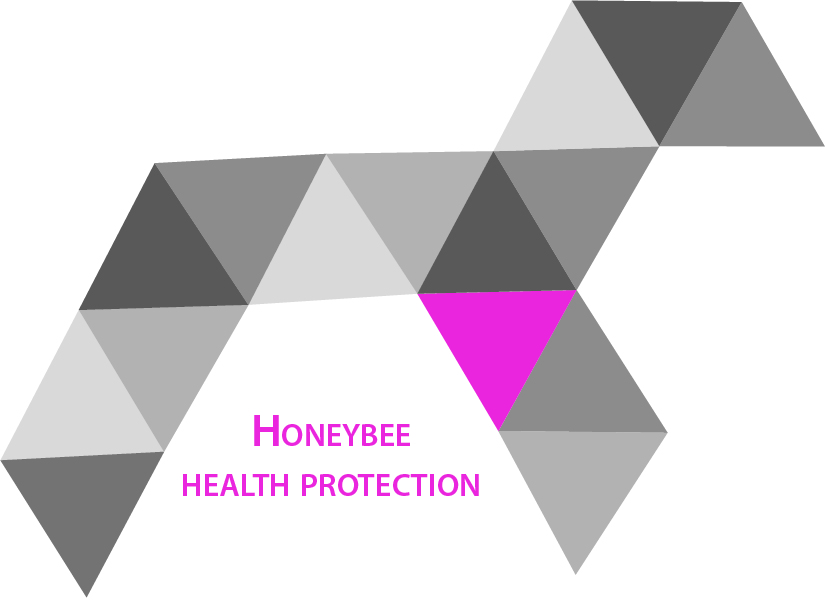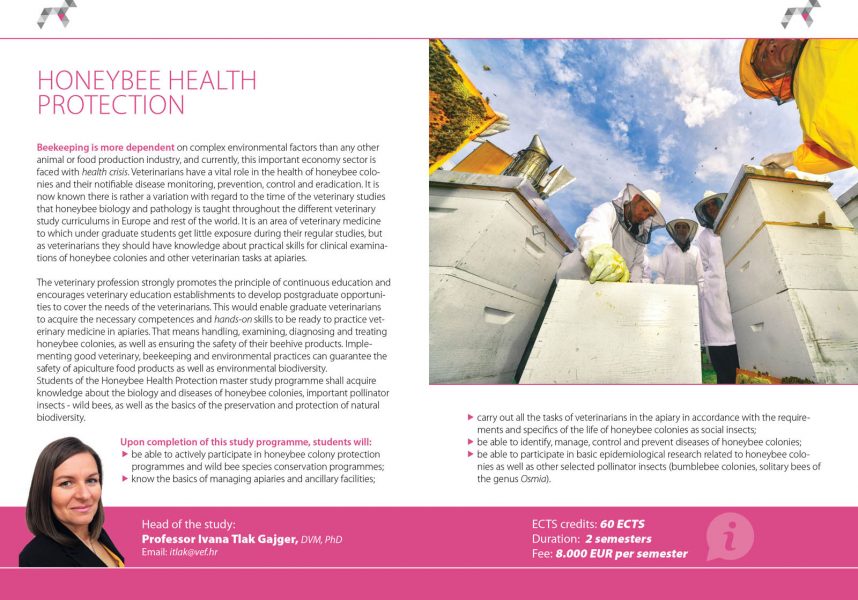Beekeeping is more dependent on complex environmental factors than any other animal or food production industry, and currently, this important economy sector is faced with health crisis. Veterinarians have a vital role in the health of honeybee colonies and their notifiable disease monitoring, prevention, control and eradication. It is now known there is rather a variation with regard to the time of the veterinary studies that honeybee biology and pathology is taught throughout the different veterinary study curriculums in Europe and rest of the world. It is an area of veterinary medicine to which under graduate students get little exposure during their regular studies, but as veterinarians they should have knowledge about practical skills for clinical examinations of honeybee colonies and other veterinarian tasks at apiaries.
The veterinary profession strongly promotes the principle of continuous education and encourages veterinary education establishments to develop postgraduate opportunities to cover the needs of the veterinarians. This would enable graduate veterinarians to acquire the necessary competences and hands-on skills to be ready to practice veterinary medicine in apiaries. That means handling, examining, diagnosing and treating honeybee colonies, as well as ensuring the safety of their beehive products. Implementing good veterinary, beekeeping and environmental practices can guarantee the safety of apiculture food products as well as environmental biodiversity.
Students of the Honeybee Health Protection master study programme shall acquire knowledge about the biology and diseases of honeybee colonies, important pollinator insects – wild bees, as well as the basics of the preservation and protection of natural biodiversity. Upon completion of this study programme, students will:
- be able to actively participate in honeybee colony protection programmes and wild bee species conservation programmes;
- know the basics of managing apiaries and ancillary facilities;
- carry out all the tasks of veterinarians in the apiary in accordance with the requirements and specifics of the life of honeybee colonies as social insects;
- be able to identify, manage, control and prevent diseases of honeybee colonies;
- be able to participate in basic epidemiological research related to honeybee colonies as well as other selected pollinator insects (bumblebee colonies, solitary bees of the genus Osmia).
ECTS points: 60 ECTS
Duration: 2 semesters
Fee: 5.000 EUR per semester
Head of the study: Professor Ivana Tlak Gajger, DVM, PhD
email: itlak@vef.unizg.hr

prof. dr. sc. Ivana Tlak Gajger

- E: ivana.tlak@vef.unizg.hr
- T: 01/2390-151
Franco Mutnelli
NRL Bee Diseases in Italy
FAO Reference Centre for Apiculture: Health and Biosecurity

Giovanni Formato
FAO Reference Centre for Apiculture: Health and Biosecurity
WOAH Collaborating Centre "Good Beekeeping Management Practices and Biosecurity Measures in the Apiculture Sector"

Aleš Gregorc

Maja Smodiš Škerl

prof. dr. sc. Srebrenka Nejedli

- E: snejedli@vef.hr
- T: 01/2390-242
Danilo Bevk

izv. prof. dr. sc. Daniel Špoljarić

- E: daniel.spoljaric@vef.hr
- T: 01/2390-155
Josipa Vlainić

Dražen Lušić

Damir Pavliček

izv. prof. dr. sc. Diana Brozić

- E: diana.brozic@vef.hr
- T: 01/2390-274
dr. sc. Ivana Sabolek

- E: isabolek@vef.unizg.hr
- T: 01/2390-291
Obligatory courses |
| Biology and physiology of bees |
| Nutrition of honeybee colonies |
| Legislation in beekeeping |
| Veterinary practices in beekeeping |
| Surveillance and monitoring of bee health |
| Infectious diseases of honeybees |
| Parasitic diseases of honeybees |
| Predators, pests and enemies of honeybee colonies |
| Intoxications of bees |
| Laboratory disease diagnostics in beekeeping |
| Principles of sanitary beekeeping practices |
Elective courses
| Biology and diseases of bumblebees and other wild bees |
| Impact of environmental health on bees |
| Basics of beekeeping technologies |
| Honeybee queens rearing and health |
| Apicultural products and apitherapy |
| Honeybee product quality control |

 Faculty of
Faculty of 